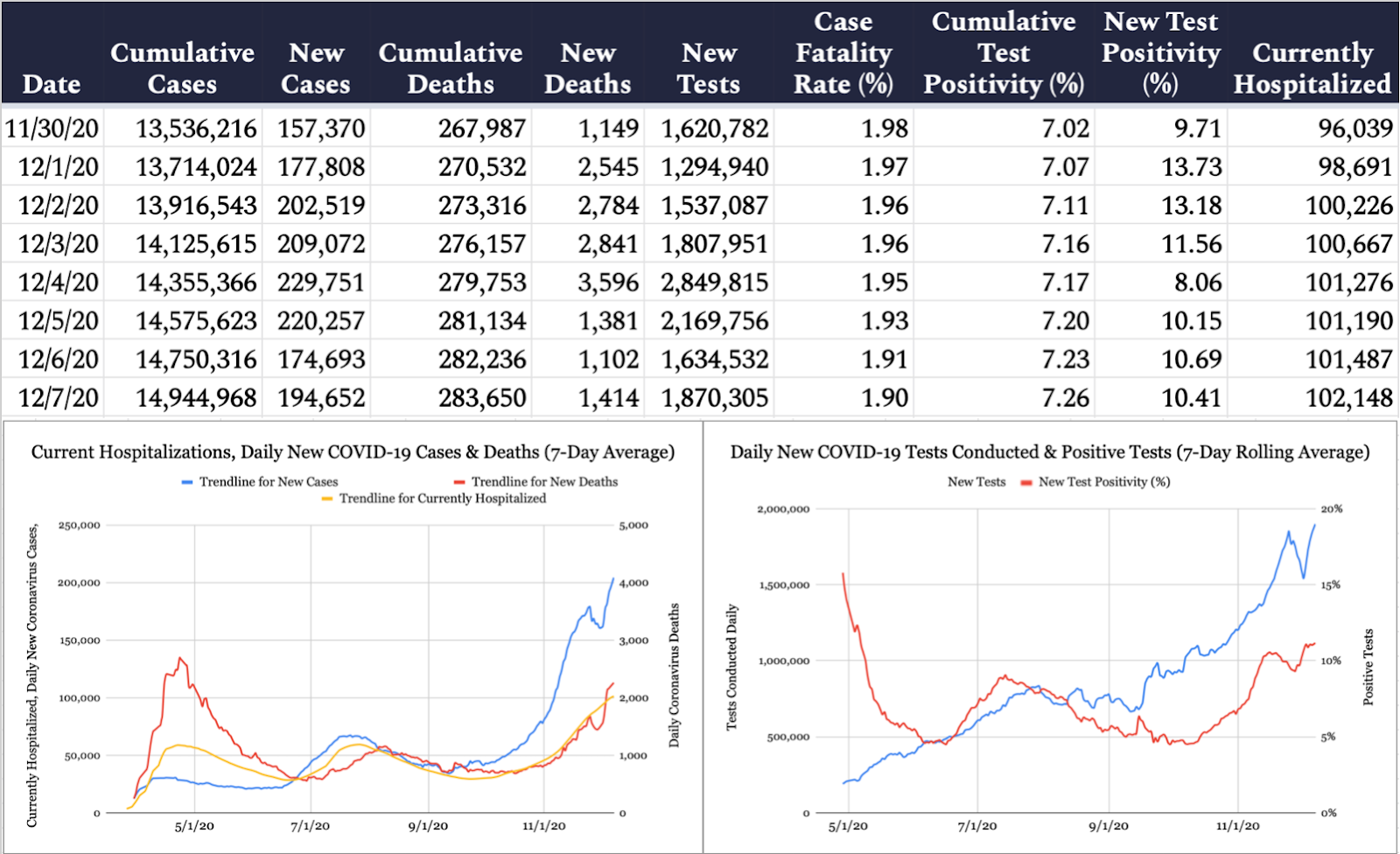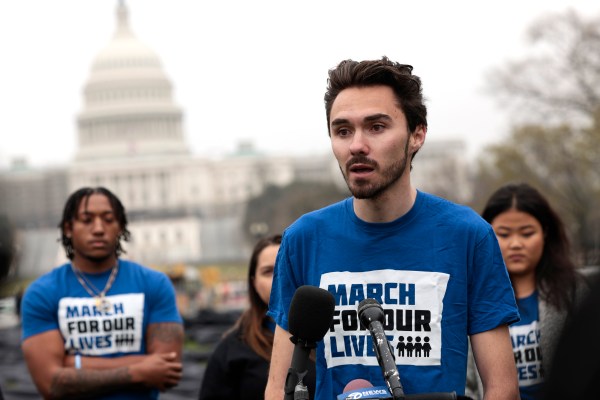Happy Tuesday! We’re suddenly realizing Christmas is less than three weeks away. When did that happen?
Quick Hits: Today’s Top Stories
-
Georgia’s Republican Secretary of State Brad Raffensperger recertified his state’s election results on Monday and again declared Joe Biden the winner. “We have now counted legally cast ballots three times, and the results remain unchanged,” Raffensperger said on Monday.
-
Today is the “safe harbor” date for states to appoint their presidential electors—a statutory deadline for states to conclude disputes over election results that creates yet another obstacle for the Trump campaign’s moonshot bid to overturn the results of the election in court. (More on this in The Sweep today.)
-
Biden is reportedly planning to nominate retired Army General Lloyd Austin to serve as his secretary of defense. If confirmed, Austin would be the first black man to hold the post.
-
The United Kingdom is scheduled to begin vaccinating its citizens today with the Pfizer/BioNTech COVID-19 vaccine today, becoming the first Western nation to do so.
-
Two of ex-Trump campaign lawyer Sidney Powell’s “Kraken” lawsuits—which she filed on her own and which challenged the results of the presidential election—were dismissed in Michigan and Georgia.
-
New York Gov. Andrew Cuomo warned that the state government may further restrict indoor dining in COVID-19 hospitalization hotpots. “If after five days, we haven’t seen a stabilization in a region’s hospitalization rate, we’re going to clamp down on indoor dining,” Cuomo said on Monday. New York City also reopened some of its public schools on Monday, acknowledging a growing scientific consensus regarding low transmission rates among children in classrooms.
-
Legendary pilot Chuck Yeager—known for becoming the first person to break the sound barrier—died last night at the age of 97.
-
The United States confirmed 194,652 new cases of COVID-19 yesterday per the Johns Hopkins University COVID-19 Dashboard, with 10.4 percent of the 1,870,305 tests reported coming back positive. An additional 1,414 deaths were attributed to the virus on Monday, bringing the pandemic’s American death toll to 283,650. According to the COVID Tracking Project, 102,148 Americans are currently hospitalized with COVID-19.

Austin, We Have a Problem
For nearly a month, as President Donald Trump and his legal team have thrashed about wildly to show that he won an election he lost, the Biden transition has unfolded in a relatively calm manner. Sure, there were grumbles about his pick to run the Office of Management and Budget, partisan warrior Neera Tanden, and, yes, the president-elect tweaked his ankle when he tripped chasing his dog in the bathroom. But it’s been pretty smooth, so far.
On Monday, however, two of Biden’s newest picks generated immediate controversy. Late Monday afternoon, multiple outlets reported that Biden planned to announce retired Gen. Lloyd Austin as his choice to serve as Secretary of Defense. Austin would be the first African-American to lead the Pentagon. But almost as soon as the announcement was made, the selection received criticism—for two main reasons.
First, Austin has been retired for only four years, and the 1947 National Security Act requires a seven-year gap (originally ten) between the end of active duty service and the assumption of the duties of secretary of defense. Exceptions can be made, and have been. Most recently, Gen. James Mattis received a waiver that allowed him to lead the Pentagon despite his not having been retired for the requisite seven years. But the law requiring that long pause, meant to ensure civilian control of the military, has strong bipartisan support and prominent leaders in both parties have expressed reluctance to grant waivers. And Biden campaigned as the leader who would return Washington to normal after the disruption of the Trump years.
Democratic Senator Jack Reed of Rhode Island, who serves as the ranking member on the Senate Armed Services Committee, warned four years ago about granting exceptions. “I personally believe such waivers would destroy the principle that is so critical to an essential tenet of our civil and military relations.”
Rep. Mike Gallagher, a Republican from Wisconsin, told The Dispatch that while Austin is a “patriot,” the “Mattis waiver was supposed to be a one-off, not the start of a trend that’s bad for civ-mil relations.”
“I’ve been delighted by Biden’s cabinet picks… until now,” said Georgetown Law professor Rosa Brooks, who served in the Pentagon under Barack Obama. “I think Biden has been very badly advised. I am just gobsmacked that his inner circle does not see what a terrible message it sends to nominate the second recently retired general in four years.”
Beyond the questions about the wisdom of another waiver, word of Austin’s nomination was met with frustration by many women—and many Democrats—who had hoped that Biden would pick Michele Flournoy, who served as Undersecretary of Defense for Policy in the Obama administration and had been considered a strong contender.
Austin would bring considerable experience to the job if he’s confirmed. He served as the top U.S. general in Iraq before being named commander of Central Command, overseeing U.S. military operations in the greater Middle East. Although he clashed with Republicans over U.S. policy in Syria and Iraq, Austin is credited with helping to create the battle plans that would eventually weaken ISIS after the jihadist group had succeeded in gaining control of vast swaths of Iraq and Syria as it built its caliphate in the region. And yet, according to some reports, Austin was cleaning up his own mess. “Early in 2014, Obama’s intelligence advisers told him that ISIS was of marginal importance,” wrote Jeffrey Goldberg in The Atlantic. “According to administration officials, General Lloyd Austin, then the commander of Central Command, which oversees U.S. military operations in the Middle East, told the White House that the Islamic State was ‘a flash in the pan.’ This analysis led Obama, in an interview with The New Yorker, to describe the constellation of jihadist groups in Iraq and Syria as terrorism’s ‘jayvee team.’”
Becerra to H.H.S.
Austin wasn’t the only Biden nominee to provoke a strong response. The president-elect picked California Attorney General Xavier Becerra to run the Department of Health and Human Services. After twelve terms representing California in the House of Representatives, Becerra made a name for himself as a defender of the Affordable Care Act in his current role as the state’s attorney general. He also led 20 states and the District of Columbia in a legal defense of the law after a GOP-led lawsuit sought to overturn the law before the Supreme Court last month.
“In Congress, I helped pass the Affordable Care Act. As California’s Attorney General, I defended it,” Becerra tweeted on Monday following the announcement. “As Secretary of Health and Human Services, I will build on our progress and ensure every American has access to quality, affordable health care—through this pandemic and beyond.”
There’s nothing surprising about Biden’s top health-care nominee celebrating Obamacare and promising to do more. But Becerra is more than that—he’s an aggressive cultural warrior and a strong advocate for abortion, of all kinds and at virtually all times. Becerra has gone hard after those who disagree with him on abortion, seeking to force Catholic institutions to provide abortion services to their employees and to prosecute pro-life activists who exposed Planned Parenthood efforts to sell the body parts of aborted babies. Becerra’s history of activism on the issue ensures that pro-life groups will push Republican senators to oppose his nomination. The Susan B. Anthony List released a statement highlighting Becerra’s support for partial birth abortion and arguing that Becerra “is aggressively pro-abortion and a foe of free speech.”
The nomination received criticism beyond the complaints of conservatives. “Some medical experts, who have been pushing the Biden team to name people with medical or public health expertise to serve in health leadership positions, were caught off guard—and unhappily so—by the news of Mr. Becerra’s selection,” reported The New York Times. Becerra brings no real experience in medicine or in-depth understanding of the government’s health care bureaucracy at a time when both qualities might be helpful.
But Biden may have assuaged some of those concerns by naming Dr. Anthony Fauci as chief medical adviser to the president on COVID-19. Fauci, who will continue his role as director of the National Institute of Allergy and Infectious Diseases, said he was honored to be asked by Biden to continue his government service.
“The President-elect’s outreach to Dr. Fauci was exactly the right move. Dr. Fauci knows more about all aspects of the nation’s pandemic response effort than anyone else. He is as close to indispensable as any one person can be in a situation like this,” James C. Capretta, a health care expert and resident scholar at the American Enterprise Institute, told The Dispatch. “He is an expert on vaccines, and on public health efforts to slow transmission of infectious diseases. The country would be in a better place today if the current administration had followed his advice more closely.”
Rounding Out the Healthcare Squad
In addition to Becerra and Fauci, Biden unveiled his picks on Monday for other key health positions to serve in his administration, signaling his aggressive approach to the pandemic the same day that more than 102,000 Americans were hospitalized across the country with COVID-19. Most of Biden’s nominations and appointments are Obama-era officials and veteran public health bureaucrats.
The first task on the health team’s docket will be overseeing the distribution of a coronavirus vaccine to millions of Americans. Assuming their posts in January will be no easy feat, as they will be tasked with helping the country recover from the worst public health crisis in recent memory. The Biden team has the good fortune of inheriting the products of Operation Warp Speed, but it will also inherit the hardest piece of the work: delivering vaccine doses equitably and efficiently.
The president-elect tapped Dr. Vivek Murthy, a doctor of internal medicine and top health adviser to the Biden campaign, for the position of U.S. surgeon general. If confirmed, Murthy will fill the same post he held under the Obama administration between 2014 and 2017, where he crafted the administration’s responses to the opioid crisis, Ebola, and Zika.
Another Obama-era official, Jeff Zients, was selected as Biden’s coordinator of the COVID-19 response—or “COVID czar”—and counselor to the President. Under Obama, Zients served as director of the National Economic Council and acting director of the Office of Management and Budget, but some of his other work experience has been the subject of criticism. Politico first reported last week that his Wikipedia page had been scrubbed of information and work experience harmful to his progressive credentials, including praise for the consulting firm Bain & Company.
For the position of CDC director, the Biden team selected Dr. Rochelle Walensky. Walensky has a laundry list of credentials—including heading the infectious diseases division at Massachusetts General Hospital, working as a professor of medicine at Harvard Medical School, and acting as a member of the U.S. Department of Health and Human Services Panel on Antiretroviral Guidelines for Adults and Adolescents.
Other notable picks include Dr. Marcella Nunez-Smith as chair of the COVID-19 Equity Task Force, a new position in the administration, and Natalie Quillian as deputy coordinator of the COVID-19 response.
“This team of world-class medical experts and public servants will be ready on day one to mobilize every resource of the federal government to expand testing and masking, oversee the safe, equitable, and free distribution of treatments and vaccines, re-open schools and businesses safely, lower prescription drug and other health costs and expand affordable health care to all Americans, and rally the country and restore the belief that there is nothing beyond America’s capacity if we do it together,” Biden said in a statement.
Trump in Georgia: The Elections May Be Rigged, But Go Vote Anyway
Republicans running for office in the Trump era have long known that, when Trump comes to rally on your behalf, you’ve got to take the good with the bad. But from the point of view of Georgia Sens. David Perdue and Kelly Loeffler, Trump’s weekend rally in Valdosta gave them plenty to be cheerful about.
This isn’t to say that Trump cleaned up his act. All the ordinary stream-of-consciousness riffing was there, as were the evidence-free claims that his reelection was stolen via mass voter fraud. But Trump delivered the senators one unalloyed gift: He emphatically rejected the argument, made by some Georgians ostensibly allied with his legal election efforts in recent days, that Loeffler and Perdue do not deserve to return to the Senate because they’ve put up an insufficient fight against the election steal themselves. Andrew writes this morning over at The Sweep:
“The Trump rally was a huge help,” one Republican operative with knowledge of the campaigns’ thinking told The Dispatch. “I can pull 30 quotes from Trump’s speech about how important it is that everyone go out and vote … Everyone in the Perdue/Loeffler orbit is happy with how that went.”
As president, Trump has made a regular habit of rallying in support of down-ballot candidates around the country. But at those rallies, his typical style is simply to riff on whatever’s on his mind for the duration of his time, sometimes only pulling the candidate up for a pep talk as an afterthought.
On Saturday, however, Trump spent roughly equal time decrying phantasms of election theft and encouraging his audience to back Perdue and Loeffler to the hilt.
Trump’s ongoing claims of election fraud have exposed two potential fault lines in the Perdue/Loeffler coalition: True believers who judge their efforts to support the president insufficient, and moderates who judge their reluctance to rebuke those claims as cowardly.
The Democratic campaigns have put little stock in the Republicans losing Trump superfans, but have hoped that Perdue and Loeffler’s tiptoeing around Trump’s “stop the steal” narrative will hurt them among moderate Republicans disgusted by Trump’s antics—the sort of voters who helped flip the state for Biden even as they gave the Republican incumbents a slight edge in the general election. Those voters aren’t likely to be won over by Sen. Perdue coming on stage on the heels of the president’s repeated false claims that he won the state to tell Trump he was going to “make sure you get a fair square deal in the state of Georgia.”
Yet faced with the choice of defending against weakness on the right flank or weakness in the center, the incumbents have plainly opted to shore up their base support.
Worth Your Time
-
WarnerMedia announced last week that it will make its 2021 slate of films available on its streaming service, HBO Max, at the same time they are released theatrically. David Sims writes in The Atlantic that the decision will be disastrous for movie theaters. “Audiences will have little incentive to pay more to see these films in theaters, even if pandemic restrictions permit, creating a new set of consumer expectations that will be hard to undo,” he writes. “Theater chains are right to fear for their survival. And WarnerMedia’s move, which seems more motivated by panic than a desire for long-term success, is a risky bet for studios, too.” Going forward, he says, cinemas “could become even more of a boutique experience, charging much higher premiums for a big-screen experience to people uninterested in viewing movies at home.”
-
When the CCP implemented its authoritarian national security law in Hong Kong this summer, Britain immediately stepped up to the plate. “In October, Britain’s Passport Office granted an average of five passports every minute to residents of Hong Kong—each one a potential lifeline to someone fleeing China’s crackdown on the formerly autonomous city,” writes Eric Boehm in Reason. Why hasn’t the United States followed suit? “Even while trying to look tough on China, the Trump administration has fumbled an opportunity to set aside its anti-immigrant zealotry to throw open the doors for Hongkongers looking to escape. President-elect Joe Biden has criticized Trump’s response to the protests in Hong Kong, but Biden has not offered many specifics about what he would do differently.”
Presented Without Comment
Also Presented Without Comment
Toeing the Company Line
-
On yesterday’s Advisory Opinions episode, David and Sarah discuss what’s next for the Trump loyalists who have an unshakable belief that the election was stolen. Our legal team looks at why so many conservative lawyers don’t buy the Trump campaign’s post-election legal strategy. Also on the docket: changes to the citizenship test, a 9th Circuit transgender bathroom case, and parental and student rights in public education.
Let Us Know
Declan had the day off yesterday—could you tell?
Reporting by Declan Garvey (@declanpgarvey), Andrew Egger (@EggerDC), Haley Byrd Wilt (@Byrdinator), Audrey Fahlberg (@FahlOutBerg), Charlotte Lawson (@charlotteUVA), and Steve Hayes (@stephenfhayes).







Please note that we at The Dispatch hold ourselves, our work, and our commenters to a higher standard than other places on the internet. We welcome comments that foster genuine debate or discussion—including comments critical of us or our work—but responses that include ad hominem attacks on fellow Dispatch members or are intended to stoke fear and anger may be moderated.
With your membership, you only have the ability to comment on The Morning Dispatch articles. Consider upgrading to join the conversation everywhere.